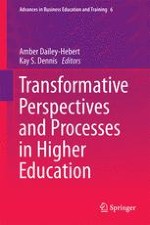2015 | OriginalPaper | Buchkapitel
9. The Potential of Communities of Learning for Dual Career PhD Programs – A Case Study
verfasst von : Martin Rehm, Mindel van de Laar
Erschienen in: Transformative Perspectives and Processes in Higher Education
Aktivieren Sie unsere intelligente Suche, um passende Fachinhalte oder Patente zu finden.
Wählen Sie Textabschnitte aus um mit Künstlicher Intelligenz passenden Patente zu finden. powered by
Markieren Sie Textabschnitte, um KI-gestützt weitere passende Inhalte zu finden. powered by
